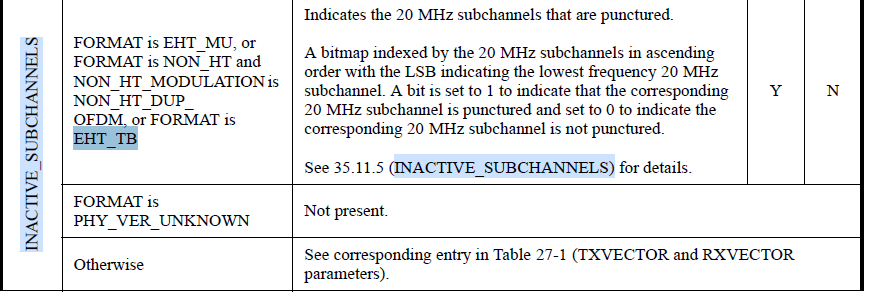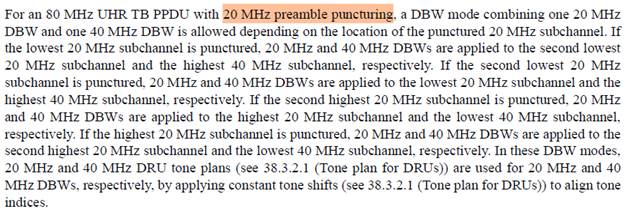Hi Eunsung,
Thanks for initiating the discussion. Overall changing preamble puncturing to unallocated would make the description for all DBWs more
consistent and easier.
Preamble puncturing indeed could happen with TB PPDU, in 802.11be 36.3.20.1.2, we have:
The puncturing pattern in an EHT MU PPDU is indicated by the punctured channel information in U-SIG field. The puncturing pattern in
an EHT TB PPDU and non-HT duplicate PPDU is determined by TXVECTOR parameter INACTIVE_SUBCHANNELS.

regards
于健
Ross Jian Yu
Huawei Technologies
发件人: Eunsung Park <esung.park@xxxxxxx>
发送时间: 2025年4月22日
14:09
收件人: STDS-802-11-TGBN@xxxxxxxxxxxxxxxxx
主题: Re: [STDS-802-11-TGBN] Preamble puncturing for TB PPDU in a DRU transmission
Hi All,
I suggest two options to resolve the CID below.
-
Option 1: change “preamble puncturing”
to “unallocated”
-
Option 2: Reject the CID based on the current motion.
I’d like to hear which option
you would prefer. Also, I am open to other options and please let me know if you have any.
Best regards,
Eunsung
From: Eunsung Park [mailto:esung.park@xxxxxxx]
Sent: Monday, April 14, 2025 11:43 AM
To: STDS-802-11-TGBN@xxxxxxxxxxxxxxxxx
Subject: [STDS-802-11-TGBN] Preamble puncturing for TB PPDU in a DRU transmission
Hi All,
I am sending this email to discuss the following CID.
|
2689 |
Youhan Kim |
No |
38.3.4 |
110 |
14 |
T |
38.3.4 |
110.14 |
I don't think we use the term 'preamble puncturing' for TB PPDU. |
Don't have a specific suggestion, but please check whether the term 'preamble puncturing' is appropriate for TB PPDUs. |
PHY |
The following is the spec text that Youhan mentions.

Basically, I agree that preamble puncturing is not generally used for TB PPDU but in the motions for DBW modes, we used this term. At first, to resolve this CID, I suggested to use
“unallocated” which is used in
11be but finally decided to defer it. I’d like to members’
opinion on this CID. Any suggestions are welcome.
Best regards,
Eunsung
To unsubscribe from the STDS-802-11-TGBN list, click the following link:
https://listserv.ieee.org/cgi-bin/wa?SUBED1=STDS-802-11-TGBN&A=1
To unsubscribe from the STDS-802-11-TGBN list, click the following link:
https://listserv.ieee.org/cgi-bin/wa?SUBED1=STDS-802-11-TGBN&A=1
To unsubscribe from the STDS-802-11-TGBN list, click the following link: https://listserv.ieee.org/cgi-bin/wa?SUBED1=STDS-802-11-TGBN&A=1